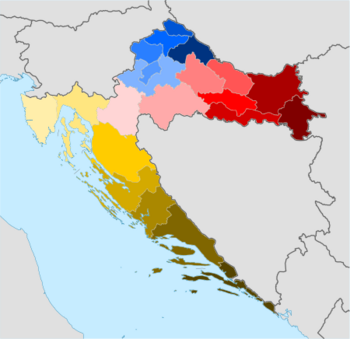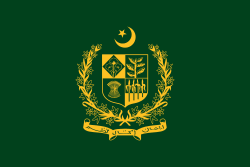Portal:Politics
| Main | Topics and categories | Tasks and projects |
The Politics portal
Politics (from Ancient Greek πολιτικά (politiká) 'affairs of the cities') is the set of activities that are associated with making decisions in groups, or other forms of power relations among individuals, such as the distribution of resources or status. The branch of social science that studies politics and government is referred to as political science.
It may be used positively in the context of a "political solution" which is compromising and non-violent, or descriptively as "the art or science of government", but also often carries a negative connotation. The concept has been defined in various ways, and different approaches have fundamentally differing views on whether it should be used extensively or in a limited way, empirically or normatively, and on whether conflict or co-operation is more essential to it.
A variety of methods are deployed in politics, which include promoting one's own political views among people, negotiation with other political subjects, making laws, and exercising internal and external force, including warfare against adversaries. Politics is exercised on a wide range of social levels, from clans and tribes of traditional societies, through modern local governments, companies and institutions up to sovereign states, to the international level.
In modern nation states, people often form political parties to represent their ideas. Members of a party often agree to take the same position on many issues and agree to support the same changes to law and the same leaders. An election is usually a competition between different parties.
A political system is a framework which defines acceptable political methods within a society. The history of political thought can be traced back to early antiquity, with seminal works such as Plato's Republic, Aristotle's Politics, Confucius's political manuscripts and Chanakya's Arthashastra. (Full article...)
Selected article
The Viet Nam Quoc Dan Dang is a revolutionary socialist political party that sought independence from French colonial rule in Vietnam during the early 20th century. Its origins lie in the mid-1920s, when a group of young Hanoi-based intellectuals began publishing revolutionary material. From 1928, the VNQDD attracted attention through its assassinations of French officials and Vietnamese collaborators. Under increasing French pressure, the VNQDD leadership switched tack, replacing a strategy of isolated clandestine attacks against individuals with a plan to expel the French in a single blow with a large-scale popular uprising. After stockpiling home-made weapons, the VNQDD launched an uprising on 10 February 1930 at Yen Bai with the aim of sparking a widespread revolt. The mutiny was quickly put down, with heavy French retribution. Nguyen Thai Hoc and other leading figures were captured and executed and the VNQDD never regained its political strength in the country. During the 1930s, the party was eclipsed by Ho Chi Minh's Indochinese Communist Party (ICP). Vietnam was occupied by Japan during World War II and, in the chaos that followed the Japanese surrender in 1945, the VNQDD and the ICP briefly joined forces in the fight for Vietnamese independence. However, after a falling out, Ho purged the VNQDD, leaving his communist-dominated Vietminh unchallenged as the foremost anti-colonial militant organisation.
Featured picture

Annkathrin Kammeyer (born 1990) is a German Social Democratic politician. She became a Member of the Hamburg Parliament on 7 March 2011, the youngest person ever elected to that body.
The lieutenant governor of Wisconsin is the first person in the line of succession of Wisconsin's executive branch, thus serving as governor in the event of the death, resignation, removal, impeachment, absence from the state, or incapacity due to illness of the governor of Wisconsin.
Forty-one individuals have held the office of lieutenant governor since Wisconsin's admission to the Union in 1848, two of whom—Warren Knowles and Jack Olson—have served for non-consecutive terms. The first lieutenant governor was John Holmes, who took office on June 7, 1848. The current lieutenant governor is Sara Rodriguez, who took office on January 3, 2023. (Full article...)

there have been 23 members appointed to the Cabinet of the United States who had been born outside the present-day United States.
Alexander Hamilton, one of the Founding Fathers who signed the U.S. Constitution, was the first cabinet member to be born outside of the United States. President George Washington appointed Hamilton, born in Nevis in 1755 or in 1757, as the United States' first Secretary of the Treasury in 1789. Irish-born James McHenry, whom Washington appointed as Secretary of War in 1796 and who served in the same post in John Adams's administration, was the other foreign-born individual in Washington's cabinet. (Full article...)
In Australian federal politics, the Leader of the Opposition is an elected member of parliament (MP) in the Australian House of Representatives who leads the opposition. The Leader of the Opposition, by convention, is the leader of the largest political party in the House of Representatives that is not in government.
When in parliament, the opposition leader sits on the left-hand side of the centre table, in front of the opposition and opposite the prime minister. The opposition leader is elected by his or her party according to its rules. A new leader of the opposition may be elected when the incumbent dies, resigns, or is challenged for the leadership. (Full article...)
The earliest organization into județe of the Principalities of Wallachia and Moldavia (where they were termed ținuturi) dates back to at least the late 14th century. For most of the time since modern Romania was formed in 1859, the administrative division system has been similar to that of the French departments. The system has since changed several times and the number of counties has varied over time, from the 71 județe that existed before World War II to only 39 after 1968. The current format has largely been in place since 1968 as only small changes have been made since then, the last of which was in 1997. (Full article...)
The prime minister of Luxembourg (Luxembourgish: Premierminister vu Lëtzebuerg; French: Premier ministre luxembourgeois; German: Premierminister von Luxemburg) is the head of government of Luxembourg. The prime minister leads the executive branch, chairs the Cabinet and appoints its ministers.
Since 1989, the title of Prime Minister has been an official one, although the head of the government had been unofficially known by that name for some time. Between 1857 and 1989, the prime minister was styled the President of the Government, with the exception of the 25-day premiership of Mathias Mongenast. Before 1857, the prime minister was the President of the Council. In addition to these titles, the prime minister uses the title Minister of State, although this is usually relegated to a secondary title. (Full article...)
Selected quote
Selected biography
George Walker Bush (born July 6, 1946) is an American politician who served as the 43rd President of the United States from 2001 to 2009. Before that he was the 46th Governor of Texas, serving from 1995 to 2000. In a close and controversial election, Bush was elected President in 2000 as the Republican candidate, defeating Vice President Al Gore in the Electoral College. A series of terrorist attacks occurred eight months into Bush's first term as president on September 11, 2001. In response, Bush announced a global War on Terror, ordered an invasion of Afghanistan that same year and an invasion of Iraq in 2003. In addition to national security issues, Bush promoted policies on the economy, health care, education, and social security reform. Bush successfully ran for re-election against Democratic Senator John Kerry in 2004, in another relatively close election. He was a highly controversial figure internationally, with public protests occurring even during visits to close allies, such as the United Kingdom.
Did you know (auto-generated) -

- ... that Disney once created a political advertisement for Dwight D. Eisenhower (featured)?
- ... that after being arrested for organizing a general strike in 1920, S. Girinis was sent to the Soviet Union following a Soviet-Lithuanian exchange of political prisoners?
- ... that Australian senator Ben Small had been a ship's officer, bar owner, paramedic, ambulance trainer, and logistician before entering politics?
- ... that one abolitionist said that William L. Breckinridge's anti-slavery views would "disqualify [him] from political usefulness"?
- ... that in the 1916 Declaration of Sainte-Adresse Britain, France and Russia committed to securing the political and economic independence of Belgium after the First World War?
- ... that despite most of the polls and 50 major political writers predicting victory for Thomas E. Dewey, Harry S. Truman won the 1948 presidential election?
More did you know...
- ...that the Communist League of America was formed after some members of the Communist Party USA were expelled for Trotskyism?
- ...that Matt Taibbi's book Griftopia has been described as a "necessary ... corrective" to the assertion that bubbles are an inevitable part of the market economy?
- ...that in the book Net.wars, author Wendy M. Grossman attributes Internet conflict in the 1990s to culture shock from an influx of users?
- ...that former California Assembly Republican Leader and California Republican Party Chair Robert W. Naylor was editor of The Stanford Daily while he was a student at Stanford University?
- ...that the Brown Dog affair, an Edwardian era vivisection controversy, led to massive riots?
- ...that during the Sixth Congress of the Cuban Communist Party, Raúl Castro proposed term limits for the country's leaders?
In this month
- May 5, 2005 – A General Election in the United Kingdom sees Tony Blair's Labour government returned to office with a reduced majority of 66.
- May 14, 1948 – The Declaration of Independence of Israel is made.
- May 18, 1948 – The first Legislative Yuan of the Republic of China officially convenes in Nanking.
News and Current events
- August 11: 4 local government areas in New South Wales, Australia locked down after COVID-19 case
- August 11: Australia: AstraZeneca vaccine access expanded by Victorian government
- August 1: Australia: Victorian lockdown lifted
- July 29: Tunisia's president dismisses prime minister, suspends parliament
- July 25: Australia: Wikinews interviews Reg Kidd, mayor of the City of Orange, about COVID-19 lockdown and local government
- July 23: South Australia enters week-long lockdown to contain COVID-19 Delta variant spread
- July 21: Technological University Dublin senior lecturer Dr Lorcan Sirr speaks to Wikinews on housing market in Ireland
- July 21: Three rural councils in New South Wales, Australia enter 7-day lockdown
- July 21: Australia: Victoria lockdown extended by a week with 85 active cases recorded
- July 15: California governor signs new state budget, eligible Californians to get stimulus payments
Topics and categories
General images
Related portals
Associated Wikimedia
The following Wikimedia Foundation sister projects provide more on this subject:
-
Commons
Free media repository -
Wikibooks
Free textbooks and manuals -
Wikidata
Free knowledge base -
Wikinews
Free-content news -
Wikiquote
Collection of quotations -
Wikisource
Free-content library -
Wikiversity
Free learning tools -
Wiktionary
Dictionary and thesaurus




























































